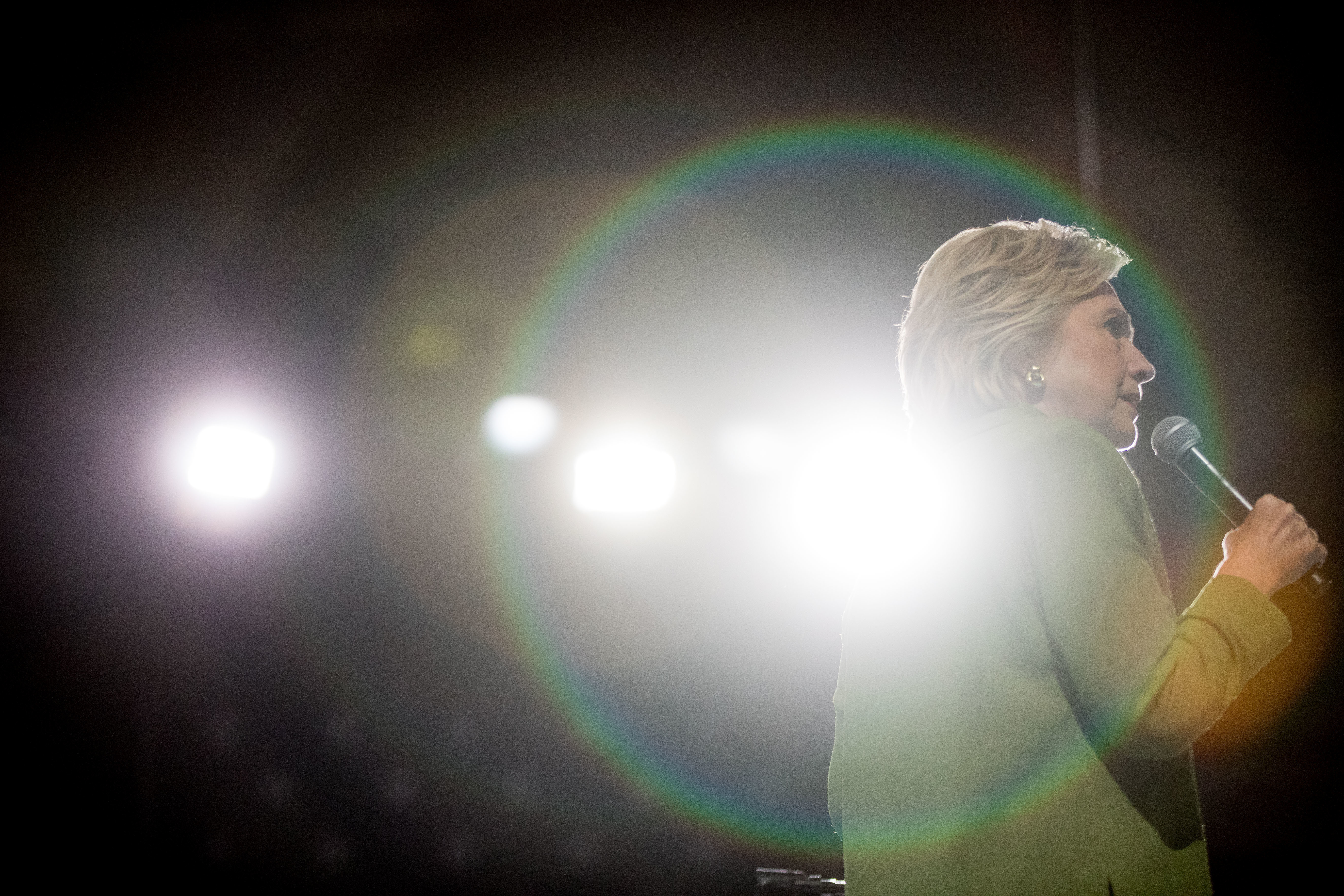How Hillary Clinton dangerously misjudged our political moment
This is not a normal election. The presumptive Democratic nominee ought to stop pretending that it is.


Hillary Clinton appears to think this is a normal election. If she's right, she'll probably win comfortably.
But she might well be wrong.
In a normal U.S. election, the two parties do battle on a simple left-right spectrum: higher taxes or lower taxes; more regulation or less regulation; greater foreign policy restraint or less foreign policy restraint; more freedom in sexual matters or less freedom in sexual matters.
The Week
Escape your echo chamber. Get the facts behind the news, plus analysis from multiple perspectives.

Sign up for The Week's Free Newsletters
From our morning news briefing to a weekly Good News Newsletter, get the best of The Week delivered directly to your inbox.
From our morning news briefing to a weekly Good News Newsletter, get the best of The Week delivered directly to your inbox.
If this is a normal election, the Clinton campaign is doing a splendid job. While she allowed the Democratic Party platform and her policy positions to drift leftward in response to the Bernie Sanders insurgency, her overall approach to the election is standard-issue Democrat. In Tim Kaine, she picked a charming, intelligent, responsible running mate who combines commitment to liberal ideals with a pragmatic sensibility. (That he might be able to help deliver Virginia and is able to break into fluent Spanish without breaking a sweat are valuable bonuses.)
Meanwhile, Clinton's message to voters is essentially "Elect me, and I'll keep the country largely on its current path, making modest adjustments to the sensible, sober, centrist-liberal approach favored by the Obama administration for the past seven years — perhaps expanding on or tinkering with some government programs here or there, maybe taking a more aggressively interventionist approach to foreign policy than the cautious one favored by the current president."
That makes a great deal of sense. Except for one thing: The Republican nominee for president isn't playing by the rules that govern a normal election. Treating Donald Trump like a conventional Republican is as foolish as insisting that what makes him unusual is that he's really a Democrat in disguise.
Trump isn't on the right or the left, as the spectrum is typically defined in American politics. His campaign presumes a different spectrum: those who favor and benefit from globalization and its consequences versus those who fear and consider themselves victims of globalization and its consequences. In this, Trump stands shoulder to shoulder with forces in the U.K. that backed Brexit, as well as with anti-establishment populists who have been making gains in recent months and years across the European continent.
A free daily email with the biggest news stories of the day – and the best features from TheWeek.com
Can Clinton win in November by refusing to play along with Trump's anti-globalist reframing of the contest? From the standpoint of standard Democratic strategy, this would involve staying relentlessly on the campaign's message while dismissing Trump as a racist lunatic who's both unfit for office and cynically whipping up irrational fears in the minds of voters. To make this case, the candidate and her running mate (and their center-left media allies) would consistently counsel calm, marshalling evidence to push back against Trump's pitch-dark convention speech, showing that the economy isn't that bad, that free-trade deals are usually good for the economy, that immigration levels are dropping, that crime isn't rising, and that terrorism isn't something to be overly concerned about.
There's just one problem with this approach: The evidence doesn't support it, at least not unambiguously. Despite economic growth and an unemployment rate under 5 percent, workforce participation rates are low and wage growth remain stagnant. Trade deals and high rates of low-skilled immigration help some regions and some segments of the economy, but they hurt others — and anyway, immigration is actually rising. Violent crime is also going up. And although 2015 saw a modest drop in the number of terrorist attacks around the globe, that came after several years of dramatic increases.
Then there's the fact that every ambush that leaves cops dead, like every terrorist attack (or foiled attack) at home or abroad, appears to provide evidence in favor of Trump's fear-focused framing of the election. Clinton, Kaine, and their surrogates can talk all they like about how driving a car or climate change is more likely to kill you than a terrorist attack. But when a deranged Islamist kills 49 in an Orlando nightclub, and then a few weeks later a man runs down 84 people with a truck in a seaside resort in France, and that's followed up in quick succession by a series of smaller attacks in Germany (three of them by recent immigrants), as well as recent massive bombings in Iraq and Afghanistan — it begins to sound to large numbers of voters like the racist lunatic who's unfit for office has a better grasp of the situation than the sober, responsible, experienced liberal in the race.
The world is a dangerous place. You're right to be afraid. It's not your fault that you're struggling. It's their fault — the corrupt people in charge, like Hillary Clinton, who systematically put their interests before yours. I am your voice and your champion, out to protect you with walls and an unwavering will. Vote for me and I will keep you safe.
If Clinton continues to treat this election like any other, she will deny Trump's premise and keep offering a third Obama term that leans a bit further to the left.
That just might work — if the number of people accepting Trump's premise can be contained. The problem is that containing it is in the hands of forces beyond her control: terrorists, cop killers, and the economy. If events continue to provide evidence to confirm Trump's message, Clinton could end up looking dangerously out of touch — an emblem of the very problem Trump promises to solve.
That's why it might be much smarter for Clinton to let go a little bit of the old assumptions. This isn't a normal election. It's a populist election driven by anxiety. And the last thing you want to do when responding to someone wracked by anxiety is deny the legitimacy of his feelings. That only inspires anger. Instead, validate the feelings. (This is something President Obama finds extremely difficult to do.)
Tell voters you understand why they're anxious and afraid about the present and future of the country. And then explain why your response is better than Trump's — how withdrawing from NATO and the World Trade Organization won't make the world less dangerous, how building a wall or gutting trade deals won't bring back the country's manufacturing sector, how the only realistic hope for the future involves national solidarity in a form that includes all Americans and resolves to come to the aid of all Americans who need it.
Validating anxieties and fears while giving voters an alternative vision of national solidarity just might pull enough potential Trump voters back from the brink to ensure a Clinton victory.
It would also have the added benefit of responding to the political reality of 2016.
Damon Linker is a senior correspondent at TheWeek.com. He is also a former contributing editor at The New Republic and the author of The Theocons and The Religious Test.
-
 Judge slams ICE violations amid growing backlash
Judge slams ICE violations amid growing backlashSpeed Read ‘ICE is not a law unto itself,’ said a federal judge after the agency violated at least 96 court orders
-
 Political cartoons for January 29
Political cartoons for January 29Cartoons Thursday's political cartoons include 2nd amendment dibs, disturbing news, and AI-inflated bills
-
 The Flower Bearers: ‘a visceral depiction of violence, loss and emotional destruction’
The Flower Bearers: ‘a visceral depiction of violence, loss and emotional destruction’The Week Recommends Rachel Eliza Griffiths’ ‘open wound of a memoir’ is also a powerful ‘love story’ and a ‘portrait of sisterhood’
-
 The billionaires’ wealth tax: a catastrophe for California?
The billionaires’ wealth tax: a catastrophe for California?Talking Point Peter Thiel and Larry Page preparing to change state residency
-
 Bari Weiss’ ‘60 Minutes’ scandal is about more than one report
Bari Weiss’ ‘60 Minutes’ scandal is about more than one reportIN THE SPOTLIGHT By blocking an approved segment on a controversial prison holding US deportees in El Salvador, the editor-in-chief of CBS News has become the main story
-
 Has Zohran Mamdani shown the Democrats how to win again?
Has Zohran Mamdani shown the Democrats how to win again?Today’s Big Question New York City mayoral election touted as victory for left-wing populists but moderate centrist wins elsewhere present more complex path for Democratic Party
-
 Millions turn out for anti-Trump ‘No Kings’ rallies
Millions turn out for anti-Trump ‘No Kings’ ralliesSpeed Read An estimated 7 million people participated, 2 million more than at the first ‘No Kings’ protest in June
-
 Ghislaine Maxwell: angling for a Trump pardon
Ghislaine Maxwell: angling for a Trump pardonTalking Point Convicted sex trafficker's testimony could shed new light on president's links to Jeffrey Epstein
-
 The last words and final moments of 40 presidents
The last words and final moments of 40 presidentsThe Explainer Some are eloquent quotes worthy of the holders of the highest office in the nation, and others... aren't
-
 The JFK files: the truth at last?
The JFK files: the truth at last?In The Spotlight More than 64,000 previously classified documents relating the 1963 assassination of John F. Kennedy have been released by the Trump administration
-
 'Seriously, not literally': how should the world take Donald Trump?
'Seriously, not literally': how should the world take Donald Trump?Today's big question White House rhetoric and reality look likely to become increasingly blurred
